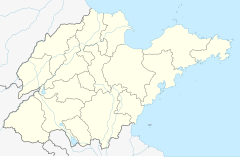Xingguo Temple (Binzhou)
| Xingguo Temple | |
|---|---|
兴国寺 | |
| Religion | |
| Affiliation | Buddhism |
| Location | |
| Location | Hubin Town, Binzhou, Shandong |
| Country | China |
| Geographic coordinates | 37°05′55″N 118°14′20″E / 37.098483°N 118.238785°E |
| Architecture | |
| Style | Chinese architecture |
| Date established | c. 534 |
| Completed | 1998 (reconstruction) |
Xingguo Temple (simplified Chinese: 兴国寺; traditional Chinese: 興國寺; pinyin: Xīngguó Sì), more commonly known as Zhangbafo (Chinese: 丈八佛; pinyin: Zhàngbāfó), is a Buddhist temple located in Hubin Town, Binzhou, Shandong, China.[1][2]
History
[edit]Xingguo Temple was first built around 534, under the Eastern Jin dynasty (266–420). Over the course of 1,470 years, the temple was destroyed and rebuilt many times, due to wars and natural disasters. The temple was gradually fell into ruin in the late Qing dynasty (1644–1911).[3]
In 1992, the 5.6-metre (18 ft) high Statue of Buddha (丈八佛) has been the focus of the Shandong Provincial Government as a provincial cultural heritage conservation unit.[4]
In 1998, Ou Tongguo (欧通国), the CEO of Shenzhen ITAT Group, appropriated a large sum of money for reconstructing the temple. Four Heavenly Kings Hall, Mahavira Hall, Hall of Zhangbafo, wing-rooms were added to the temple.[5]
In the middle of 2004, Shi Changgu (释常固) was proposed as the new abbot of the temple. He raised funds to establish the Dining Hall, Meditation Hall, Reception Hall and other halls.
Architecture
[edit]5.6-metre (18 ft) high Statue of Buddha
[edit]The 5.6-metre (18 ft) high Statue of Buddha was carved around 534, in the 1st year of Tianping period of the Eastern Jin dynasty (266–420). It is 7.1-metre (23 ft) high in total.[6][7]
Sitting on the lotus throne peacefully, the plump Buddha wears a Kasaya. The lotus throne is 1.55-metre (5 ft 1 in) high and weights 19-kilogram (42 lb). It was engraved patterns of various Hercules, Hill censer (Boshanlu), Garuda and 24 human figures.
References
[edit]- ^ Yu Linfan (2018-02-23). 博兴县丈八佛庙会盛大举行 吸引全国各地游客香客. dzwww.com (in Chinese).
- ^ 丈八佛庙会让您流连忘返(组图). 163.com (in Chinese). 2014-02-10.
- ^ 齐鲁特色文化丛书: 名胜. 齐鲁特色文化丛书 (in Chinese). 山東友谊出版社. 2004. p. 409. ISBN 978-7-80642-744-6. Retrieved 2024-05-06.
- ^ 山东省历史文化遗址调查与保护研究报告 (in Chinese). 齊魯書社. 2008. ISBN 978-7-5333-2153-6. Retrieved 2024-05-06.
- ^ 山东省滨州市地方史志编纂委员会 (2003). 滨州地区志, 1979-2000. 中华人民共和国地方志丛书 (in Chinese). 方志出版社. p. 826. ISBN 978-7-80122-846-8. Retrieved 2024-05-06.
- ^ Qian Huanqing (2014-04-17). “丈八佛”传奇. jnsb.e23.cn (in Chinese (China)). Retrieved 2020-01-06.
- ^ 碑刻造像. 山东文物丛书 (in Chinese). 山东友谊出版社. 2002. p. 427. ISBN 978-7-80642-396-7. Retrieved 2024-05-06.

